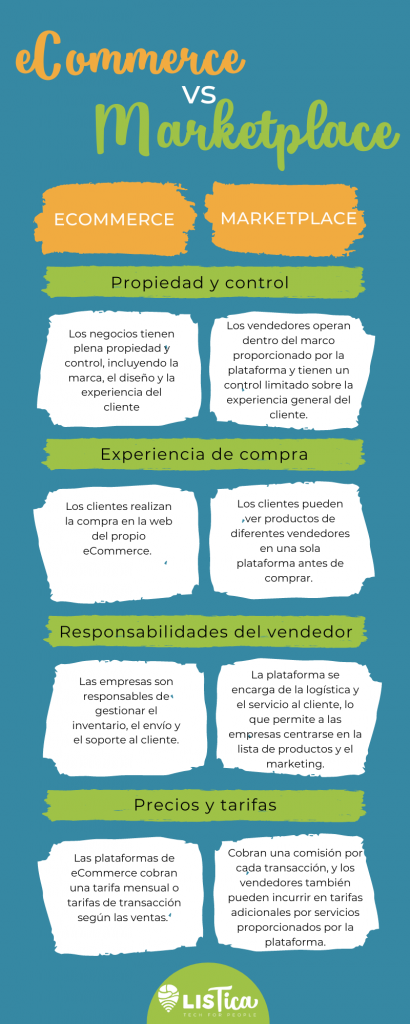
E-commerce has experienced exponential growth in recent years, allowing companies to expand their reach and reach a global audience.
So you may have heard the terms eCommerce and marketplace.
Although both concepts refer to ways of selling products online, there are some significant differences between them.
In this article, we tell you all about eCommerce and marketplace so you can decide which is the best option for your business.
What is eCommerce?
An eCommerce is an e-commerce website where a brand's products are sold.
Most of the time they focus on specific niches. For example, clothing stores, costume stores, pet supply stores, online bookstores, grocery stores.
There are several popular ecommerce platforms such as Shopify, WooCommerce, SquareSpace, BigCommerce and Magento.
In addition, these platforms allow for customization, inventory management, secure payment gateways and integration with various shipping providers.
Advantages of eCommerce
- Flexibility and control over design, functionality and user shopping experience.
- Direct relationship with the customer.
- More profit margin, since by selling through your own website, you avoid paying commissions to third parties.
- It allows you to build a strong brand and foster long-term customer loyalty.
- You will have data-driven information on customer behavior, which will serve to optimize your marketing strategies and improve conversions.
Disadvantages of eCommerce
- Requires a significant initial investment.
- Increased logistical responsibility. Companies must manage inventory and ship products themselves.
- Intense competition, as there are many eCommerce competing for customers' attention.
What is marketplace?
A marketplace is a digital platform that brings together online stores that sell products or services from different vendors and all kinds of categories. In other words, something similar to a shopping mall, but online.
Some popular examples of marketplaces are Amazon, eBay, Etsy, AliExpress, Walmart, MercadoLibre.
Sellers can list their products on the marketplace and leverage its reach and visibility to reach a wider audience.
Advantages of marketplaces
- Easy start-up.
- Saving administrative processes, since it is the marketplace who does the transactions and income for you.
- Dropshipping option (the marketplace gives you the possibility to manage stock, shipments and returns on your behalf).
Disadvantage of marketplaces
- Less customization.
- Transaction fees and additional costs.
- You cannot create a customer database for future marketing purposes.
Differences between eCommerce and marketplace
While eCommerce and marketplaces share the goal of facilitating Internet transactions, there are several key differences::

eCommerce vs. marketplace: which one to choose?
There is no single answer, because it depends on several factors. Here are some that you should take into account to know which is the best option for your business:
- Types of products and market niche: Some products work well in a marketplace, while others will sell better in a specific online store.
- Growth strategy: If your goal is to reach a wider audience quickly, a marketplace can provide you with the necessary reach. On the other hand, if you are looking to build your own brand and have more control, eCommerce will be a good option.
- Available resources: Evaluate your financial resources, technical skills and ability to manage logistics before making a decision.
- eCommerce experience: f you have previous experience in eCommerce and are confident in your skills to manage an online store, it may be a more viable option. And if you are just starting to sell online, opt for the marketplace.
Ultimately, the choice between eCommerce and marketplace will depend on your budget, needs and specific objectives.
Remember that both can be effective online sales strategies, and the most important thing is to offer quality products and services, provide a good customer experience and continuously adapt to market demands.
So carefully evaluate your options, consider your resources and make an informed decision that aligns with your business goals.
And you, do you already have an eCommerce or marketplace or have you thought about it? If you are thinking about creating an eCommerce or a marketplace, we can help you with it, contact us.


